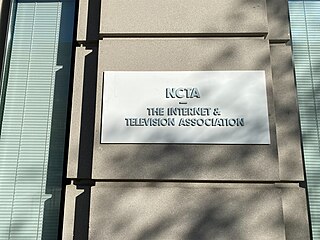
The National Telecommunications and Information Administration (NTIA) is an agency of the United States Department of Commerce that serves as the president's principal adviser on telecommunications policies pertaining to the United States' economic and technological advancement and to regulation of the telecommunications industry.
Nonprofit technology is the deliberative use of technology by nonprofit organizations to maximize potential in numerous areas, primarily in supporting the organization mission and meeting reporting requirements to funders and regulators.
Municipal broadband is broadband Internet access offered by public entities. Services are often provided either fully or partially by local governments to residents within certain areas or jurisdictions. Common connection technologies include unlicensed wireless, licensed wireless, and fiber-optic cable. Many cities that previously deployed Wi-Fi based solutions, like Comcast and Charter Spectrum, are switching to municipal broadband. Municipal fiber-to-the-home networks are becoming more prominent because of increased demand for modern audio and video applications, which are increasing bandwidth requirements by 40% per year. The purpose of municipal broadband is to provide internet access to those who cannot afford internet from internet service providers and local governments are increasingly investing in said services for their communities.

NCTA, formerly known as the National Cable & Telecommunications Association (NCTA), is a trade association representing the broadband and cable television industries in the United States. As of 2011, NCTA represented more than 90% of the U.S. cable market, over 200 cable networks, and various equipment suppliers and service providers to the cable industry.

CTIA is a trade association representing the wireless communications industry in the United States. The association was established in 1984 and is headquartered in Washington, D.C. It is a 501(c)(6) nonprofit membership organization, and represents wireless carriers and suppliers, and manufacturers and providers of wireless products and services.
The Universal Service Fund (USF) is a system of telecommunications subsidies and fees managed by the United States Federal Communications Commission (FCC) intended to promote universal access to telecommunications services in the United States. The FCC established the fund in 1997 in compliance with the Telecommunications Act of 1996. The FCC is a government agency that implements and enforces telecommunications regulations across the U.S. and its territories. The Universal Service Fund's budget ranges from $5–8 billion per year depending on the needs of the telecommunications providers. These needs include the cost to maintain the hardware needed for their services and the services themselves. The total 2019 proposed budget for the USF was $8.4 billion. The budget is revised quarterly allowing the service providers to accurately estimate their costs. As of 2019, roughly 60% of the USF budget was put towards “high-cost” areas, 19% went to libraries and schools, 13% was for low income areas, and 8% was for rural health care. In 2019 the rate for the USF budget was 24.4% of a telecom company's interstate and international end-user revenues.

The Benton Institute for Broadband & Society, until 2019 known as the Benton Foundation, is a nonprofit organization set up by former U.S. Senator William Benton and his wife, Helen Hemingway Benton. Their son, Charles Benton, served as chairman and CEO until his death in 2015.

Free Press is a United States advocacy group that is part of the media reform or media democracy movement. Their mission includes, "saving Net Neutrality, achieving affordable internet access for all, uplifting the voices of people of color in the media, challenging old and new media gatekeepers to serve the public interest, ending unwarranted surveillance, defending press freedom and reimagining local journalism." The group is a major supporter of net neutrality.

The Internet in the United States grew out of the ARPANET, a network sponsored by the Advanced Research Projects Agency of the U.S. Department of Defense during the 1960s. The Internet in the United States of America in turn provided the foundation for the worldwide Internet of today.
Net Literacy is an Indianapolis based 501(c) non-profit organization that promotes computer and Internet literacy. The program is youth-run, with adult mentoring. All participants receive instruction for free.
Public Knowledge is an American non-profit public interest group based in Washington, D.C. Founded in 2001 by David Bollier, Gigi Sohn, and Laurie Racine, Public Knowledge is primarily involved in the fields of intellectual property law, competition and choice in the digital marketplace, and an open standards/end-to-end internet.
The World Wide Web Foundation, also known as the Web Foundation, is a US-based international nonprofit organization advocating for a free and open web for everyone. It was cofounded by Tim Berners-Lee, the inventor of the World Wide Web, and Rosemary Leith. Announced in September 2008 in Washington, D.C., the Web Foundation launched operations in November 2009 at the Internet Governance Forum.

Julius Genachowski is an American lawyer and businessman. He became the Federal Communications Commission Chairman on June 29, 2009. On March 22, 2013, he announced he would be leaving the FCC in the coming weeks. On January 6, 2014, it was announced that Genachowski had joined The Carlyle Group. He transitioned from Partner and Managing Director to Senior Advisor in early 2024.
Connecting America: The National Broadband Plan is a Federal Communications Commission (FCC) plan to improve Internet access in the United States. The FCC was directed to create the plan by the American Recovery and Reinvestment Act of 2009, and unveiled its plan on March 16, 2010.
Colin Crowell is an American public policy expert active the telecommunications and Internet sector. He is currently the head of the Blue Owl Group. Crowell is the former Vice President of Global Public Policy and Philanthropy at Twitter, where he was the company's first public policy hire. Crowell was initially brought on board to build out this function globally for Twitter.
Computer technology for developing areas is a field focused on using technology to improve the quality of life and support economic development in regions with limited access to resources and infrastructure. This area of research seeks to address the digital divide, which refers to the gap between those who have access to technology and those who do not, and the resulting inequalities in education, healthcare, and economic opportunities.
The Federal Communications Commission Open Internet Order of 2010 is a set of regulations that move towards the establishment of the internet neutrality concept. Some opponents of net neutrality believe such internet regulation would inhibit innovation by preventing providers from capitalizing on their broadband investments and reinvesting that money into higher quality services for consumers. Supporters of net neutrality argue that the presence of content restrictions by network providers represents a threat to individual expression and the rights of the First Amendment. Open Internet strikes a balance between these two camps by creating a compromised set of regulations that treats all internet traffic in "roughly the same way". In Verizon v. FCC, the Court of Appeals for the D.C. Circuit vacated portions of the order that the court determined could only be applied to common carriers.
The digital divide in the United States refers to inequalities between individuals, households, and other groups of different demographic and socioeconomic levels in access to information and communication technologies ("ICTs") and in the knowledge and skills needed to effectively use the information gained from connecting.
The digital divide is described as the characterisation of the gap between individuals or countries that have access to information and communications technologies, primarily telecommunications and the Internet, and individuals or countries that do not. This also includes, but is not limited to: access to computers, broadband, information literacy and digital skills.
ConnectEd is a United States Federal Government Initiative that aims to increase internet connectivity and technology in all public schools to enhance learning. The ConnectEd initiative is funded through Title IV Part A of the Every Student Succeeds Act (ESSA), which designates specific monies for the effective use of technology in schools. The 2016 National Education Technology Plan aligns with ConnectEd as a published action plan to meet these goals of technology integration and connectivity.






